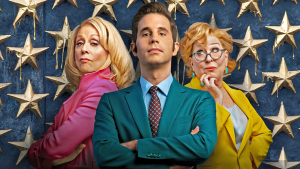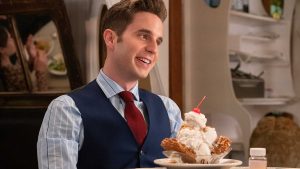As I noted several weeks ago in my review of Ryan Murphy’s Hollywood, I never reviewed The Politician, one of his other, most recent, soapy melodramas laden with intrigue, conflict and meandering filler episodes – in fact, the review I was planning to write for the first season (which debuted on Netflix last year) still sits in my drafts, not even half-finished. So have I come around to the series in the intervening months and hopped on the bandwagon for this new, second season of the show? Well, no.
If anything, the problems that kept me from feeling motivated to write a review of season one have only gotten worse in season two: but that’s, I suspect, why I’m finally talking about it. Because The Politician is very loud – obnoxiously so, at times – about how deep and multi-faceted it seems to think it is, but once you remove all the glossy embellishments and fancy trappings, this story is as shallow as its central character, and I think it’s time I said something about it.

In both seasons, each episode opens with a tantalizingly disturbing montage of the titular politician, ruthlessly ambitious entitled white college student Payton Hobart (Ben Platt), as he is constructed from scratch, his body pieced together, polished and painted like a mannequin’s. And each time I see it, I wonder if the episode I’m about to watch is finally going to be the one that follows through on the promise of that intro: diving deep into this character’s clearly troubled existence and exploring who he really is behind all the hollow campaign promises and performative publicity stunts – but we never go there, or at least not far enough that it counts. Payton merely continues on a straight line towards the White House, and before long the story forgets about his moments of internal drama and moves on to the next scandalous bombshell. After all, who would want to sit through an intricate character study detailing the fragility of a politician’s mental and emotional state when we could just watch Dede Standish (Judith Light) and Hadassah Gold (Better Midler) debate what’s the best way to reveal to the public that Standish is in a committed three-way relationship with two men?
Unfortunately, I’m not confident enough in this show’s storytelling abilities to assume that The Politician‘s version of an intricate character study would actually be more interesting than the scandalous details of Standish’s unorthodox love life. Light and Midler outshine Ben Platt in every way, with powerhouse performances that make me wish this show was all about them and their deliciously wicked smear campaign. Light plays Standish as a charismatic, charmingly devious state senator who has her eye on the Vice Presidency (I’m a bit confused as to why a state senator is even in the running for VP, and especially so far before a Presidential election cycle, but it’s fine, I guess). Midler’s character is a White House Press Secretary in the making: fiery, cunning, and ready and willing to use any situation to her political advantage (and again, strangely well-known and respected in political circles despite only being the personal assistant of a state senator). Only in the very last episode of the season does Platt finally stand alongside them as their equal, and that’s only because he gets to sing in that episode: for a hot minute, I was deeply concerned we would go through this entire season without Platt getting to make any use of his vocal talents – in the end, I felt having him sing two songs one after the other at a New York City nightclub was maybe a little forced, but the show was working with a small number of episodes, and one of those was spent on the requisite “day-in-the-life-of-an-average-voter” scenario, so I can’t blame them for having to force it to make it work.

One thing I didn’t quite understand was why so much of the story is packed into the first half of the season, leaving the later episodes feeling somewhat empty and underdeveloped – in particular, there’s one massive time-jump that completely skips what should be a crucial period in Payton’s life: did coronavirus get in the way, and prevent some much-needed additional filming? Was the decision to cut things short made halfway through filming? Because there are a whole bunch of story threads, such as the sleazy junior senator from Texas with a comatose wife or Andrew (Ryan J. Haddad) and his unhealthy obsession with Infinity Jackson (Zoey Deutch), or McAfee‘s (Laura Dreyfuss) entire character arc, that are built up in the first half of the season – and then just…go away, or are suddenly resolved without warning.
Several of the supporting characters also shuffle around aimlessly on the sidelines for most of the story, pledging their undying loyalty to Payton before predictably stabbing him in the back; then repeating the cycle several times over. Astrid (Lucy Boynton), one of the major players in the first season, has virtually nothing to do throughout seven episodes except stare moodily at Payton, and engage in a boring love triangle with him and his love interest Alice (Julia Schlaepfer), with whom Payton intends to build a political dynasty rivaling the Kennedys or Roosevelts. Despite being enemies most of the time, Astrid and Alice are basically interchangeable, both imbued with the same dead-to-the-world attitude. It’s funny for specific moments (I’d mention one of Alice’s line deliveries in particular, but it’s a spoiler), but boring and downright grating after a while.

Another casualty of the second season is LGBTQ+ representation, something that was prominent in the first. It’s oddly revealed that River (David Corenswet), a character who committed suicide early in season one and lives on as the physical embodiment of Payton’s conscience, was never actually gay or bisexual – he just wanted to be intimate with everyone. It’s hard to tell if Payton himself is even being written as LGBTQ+ anymore, either: he still sees River frequently in visions, but he seems indifferent to him, and it’s even hinted that he didn’t really feel any strong physical attraction to him when he was alive. There are a number of other characters on the show who are still on the LGBTQ+ spectrum, including McAfee (shown to have a number of ex-girlfriends) and Skye (Rahne Jones, who for some reason is the only Black woman in the main cast), but their roles are minor and their sexual orientations only briefly touched upon. For a series that is, once again, obnoxiously loud about how progressive and forward-thinking it is, it seems strange to walk back the revelation that the leading man could possibly be LGBTQ+, especially in a way which seems to sacrifice so much of the chemistry that Platt and Corenswet shared in their brief time onscreen together.
One more thing that disappoints me but doesn’t necessarily surprise me about the show: despite being titled The Politician, this series doesn’t really focus too heavily on the political scene – two seasons in, and we haven’t even seen the inside of the state senate chamber in Albany, much less the White House, presumably Payton’s final destination if he doesn’t finally destroy his own career before then. The politics seem engineered as an excuse for eye-catching intrigue, tabloid-headline gossip and shocking scandal, and it’s clear to me that this show might have benefited from being written from the perspective of one of Payton Hobart’s P.R. team. Payton never has any political advisors with him, his only debate performance is focused on obtaining clever soundbites, and his campaign is based around fostering an unstoppable millennial movement rather than actually offering any substantial solutions to the climate change problem that rather abruptly becomes his only real talking point. He’s all spectacle and no substance – and while that may have worked when he was running for school president back in Santa Monica, it begins to feel eerily Trump-like once you put him in an actual election.

And again, that might have worked if the show made any attempt at exploring him as a character and/or examining how that approach to politics is harmful: in fact, it could have been extremely relevant to our modern political climate, allowing us a look into what forces shape the megalomaniacs and dictators of tomorrow. But the show doesn’t make that attempt, and so we’re left with a character who walks like a progressive, idealistic liberal, talks like a progressive, idealistic liberal, and may or may not be a progressive, idealistic liberal behind all the mental blocks and barriers he puts up to hide himself from the world. Until the show finds the courage to start breaking down those barriers, we may never know the truth.
Series Rating: 5/10